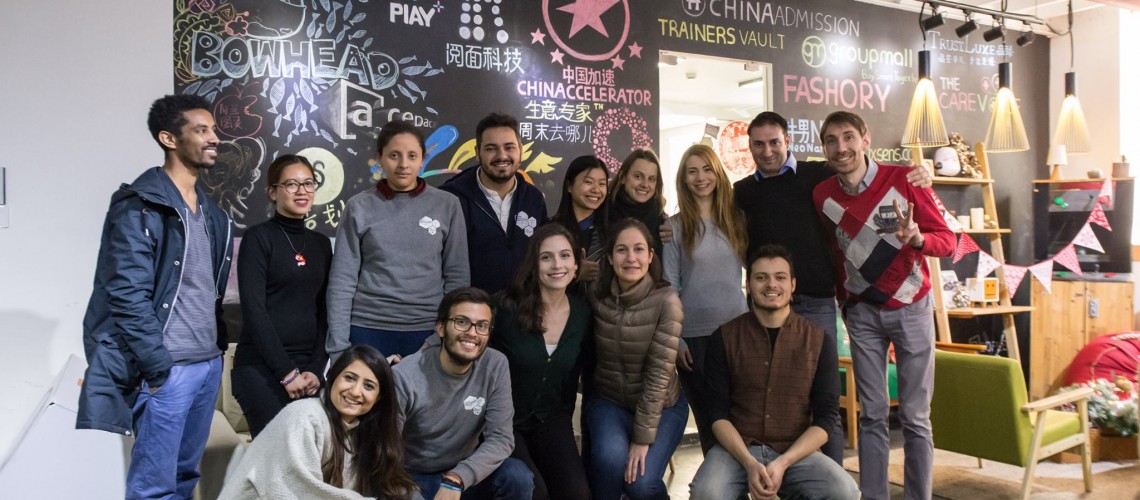
Italian creativity meets the urban environment, Startup systems and the role of large accelerators in Shanghai. The new frontiers of food? From pasta with cricket flour to cupcakes made with grasshoppers!
During their trip our students of Food Innovation Global Mission discovered Shanghai not just as the most populous city of the world, but also as a place where Italian creativity has managed to merge with all the great possibilities of an urban environment—searching for solutions for the future, especially when talking of food.
The delegation met many crucial players during this trip, the longest in continental Asia after Korea and Japan, and the second to last destination for the Food Innovation Global Mission that will end in Singapore, the perfect bridge between East and West, before returning to the Emilian food valley after over two months of travel. The students were welcomed to Shanghai with iAperitivo, an informal networking event organized by the Italian entrepreneur Paolo Privitera at the House of Roosevelt where, from the attic, the students could view the city skyline while meeting and greeting prominent people such as Valtero Canepa, president of Slow Food China and Michelazzo Corrado, executive chef of the restaurant 10 Corso Como in Shanghai.
During this trip, one of the most crucial events around innovation was the meeting “Feeding Our Growing Planet: Is Tech the Future of Food?” that took place at the Chinese headquarters of IDEO, one of the most famous design studios in the world and a company already visited by the delegation during the California stop. Speakers addressing the topic included Federico Duarte, founder of Mill Food Intelligence, who spoke and presented on the current state of food tech in the United States, Sara Roversi, founder of the Future Food Institute trust and one of the main supporters of the Food Innovation Program who gave a European perspective, and Matilda Ho, founder of Bits x Bites, the first accelerator in China dedicated only to food and organizer of the entire event. This Meetup allowed the delegation to encounter young Italians that with Bits x Bites to advance their startups such as Simone Rebaudengo, a designer from Turin and expert in new technology, as well as Massimo Reverberi of Bugsolutely, a startup founded in Bangkok that unites the Asian gastronomic tradition of edible insects with the Italian pasta tradition. Bugsolutely produces and sells (in the countries that allow for it) a pasta made from cricket flour with the aim to fight food shortages by taking advantage of a widely available resource (insects) in an innovative and environmentally friendly manner since raising these small animals has a much lower impact on environmental pollution than typical animal rearing. From theory to practice, it wasn’t just classroom lessons, but genuine experimentation in the field, like insect tasting at Bugs Cafè with cupcakes made from grasshopper flour and donuts with spiders.
The promotion of Italian culture in Shanghai is one of the goals of another important event that the delegation of the Food Innovation Global Mission experienced: Italian Design Day. The Italian Institute of Culture in Shanghai and the Italian Consulate organized the various presentations at East China Normal University, one of the most prestigious Chinese universities. The event gave the opportunity for the Chinese community to celebrate alongside the students all things Made in Italy: from object, to design and to final product. Matteo Vignoli, academic director of the Food Innovation Program and professor at the University of Modena and Reggio Emilia (supporter of the FIP international master) explained what food means in Italian culture: “It’s tradition, experimentation, but above all a collaborative way to spark innovation.”
In addition to experiencing different Italian organizations born and raised inside the entrepreneurial ecosystem of Shanghai, the students of the Food Innovation Program went on to discover some of the most innovative food heros of the city. They met founders of small companies including Elizabeth Schiefflin, creator of Lizzy’s All Natural, which produces smoothies especially formulated with select ingredients for maximum health, to Jenny Gao who explained to the delegation how all her products respect the traditions and tastes and colors of Szechuan cuisine, and even Sebastian Martin who told of how he decided to bring the flavor of sustainable, small scale production coffee into the heart of this cosmopolitan city with Cambio Coffee. In addition, they encountered large distributors with Hunter Gatherer, a huge supermarket that fights junk food by only selling select products that allow their customers to reconnect with nature through their food, something that is often lost in city life. Finally, the delegation experienced Chinaccelerator, the largest Chinese accelerator for startups that wants to cross borders by opening even more of the market in their country to the ebb and flow of innovative entrepreneurship projects.
As in the previous legs, the Mission was also supported by an academic partner in Shanghai, this time the University of Tonji, one of the oldest and most prestigious of China, that gave the students the possibility to explore food waste through a specially organized workshop.
Last step: Singapore!
Stay tuned and follow this amazing lifetime experience “live” on Facebook, Twitter, LinkedIn, YouTube and Instagram using the hashtag #FIGM17
© 2015 Food Innovation Master Degree | © 2014 FUTURE FOOD INSTITUTE
